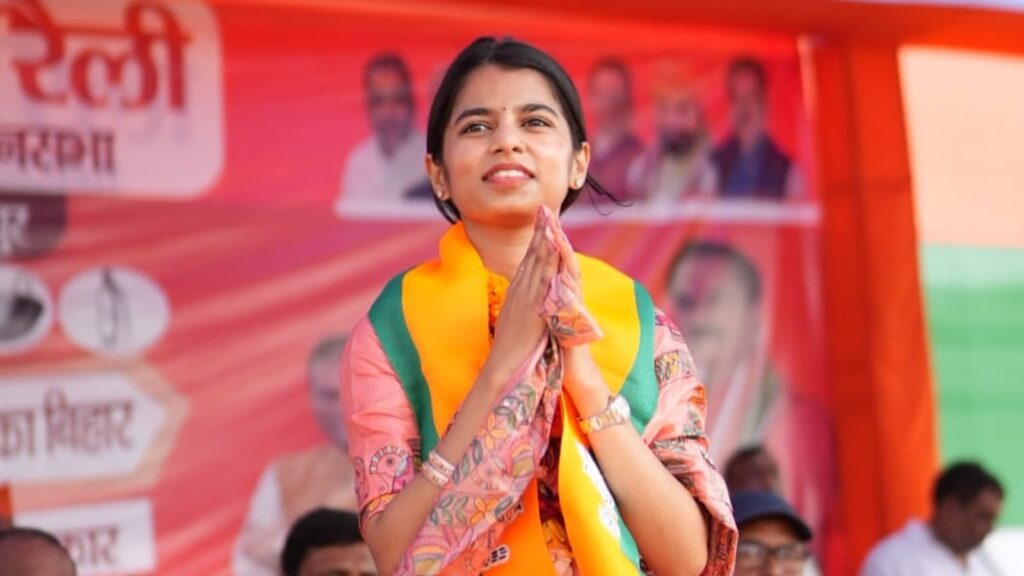Maithili Thakur has been singing the stories and songs of Mithilanchal for almost a decade now, becoming one of its most recognisable voices in the digital age. Now, the 25-year-old is set to feature among the youngest candidates in the Bihar electoral fray, as a BJP candidate from Alinagar in Darbhanga.
At an event Tuesday in Patna where she joined the BJP, Thakur spoke about being “influenced by Prime Minister Modi” and wanting to “serve the people”. On her own agenda, she said she would do exactly what “the party orders me to do” and will “take the party’s ideology to everyone”.
The Alinagar seat was won by the Vikassheel Insaan Party’s Mishri Lal Yadav in 2020 by a narrow margin against the RJD’s Binod Mishra. Yadav, who moved to the BJP later, was disqualified in May this year after a court conviction in an assault case. In October, Yadav resigned from the BJP, calling it “anti-Dalit”.
Across North and Central India, especially in and around Bihar, Thakur is a household name due to her performances, mainly rooted in Maithili, Bhojpuri, Hindi and Sufi traditions. She is known for singing traditional sohars, Bhojpuri nirgun geet, Ram-Seeta vivah geet, bhajans, Chhath geet, semi-classical kajris, horis, chaitis, ghazals and Sufi songs, accompanied often by her brothers Rishav and Ayachi.
Thakur’s popularity has also soared on account of her Ram bhajan videos, released on YouTube during the Ram Temple consecration in Ayodhya. She has over five million subscribers on YouTube now, over six million followers on Instagram and over 14 million on Facebook – an appeal cutting across caste and community, which the BJP is hoping to build on.
While there are many Bhojpuri music and film stars in politics, particularly in Bihar, Thakur is different in sticking to its folk roots, and consciously keeping away from the innuendo-laden lyrics and risque representations that Bhojpuri cinema has come to be associated with, making her a symbol of regional pride.
Thakur grew up listening to folk music hummed by her grandmother in their ancestral home. But she learned Hindustani classical music from her father Ramesh Thakur. In the videos put up by the family online in the initial days, one can see Thakur and her two brothers sitting on their bed next to the trophies they have won, and a harmonium and a tabla, at their modest home in Delhi. There was no special recording equipment, or auto tuners or studio.
It was their father’s idea to post these videos online, Thakur said to The Indian Express in 2018. “We wanted people to listen to the beautiful world of Bhojpuri folk, which is melodious and has wonderful lyrics. Ye theth Bhojpuri hai. Ise sunana bhi zaroori hai (This is classic Bhojpuri, listening to it is also necessary).”
With Thakur’s fame rising, she was chosen by the Election Commission as its brand ambassador for Madhubani in 2023. In 2024, the Modi government picked her for the Cultural Ambassador of the Year Award.
While Thakur was born in Uren in Madhubani’s Benipatti, about two hours from Alinagar from where she is contesting elections, she moved to Delhi when she was about eight. It was mainly to learn music from Ramesh, who taught music at a local school in the Capital as well as gave home tuitions.
In a recent interview to ANI, Ramesh linked his shift to Delhi to the “backward caste movement” in Bihar, putting upper castes such as them at a disadvantage, and “the criminal-political nexus” of the ’90s, under Lalu. “There were attacks on Brahmins, and our farm lands were seized.”
Ramesh was strict with his children, Thakur has often said, with early morning discipline and riyaaz compulsory. But having grown up in Benipatti and then spent her formative years surrounded by the language, and its folklore and songs, Thakur was quick to pick up the skills, combining the technicalities of classical music with the folk she presented.
In 2015, Thakur, who was enrolled at Delhi’s Bal Bharti International School and did her graduation from Bharti College, participated in the Indian Idol Junior show, but faced rejection in the second round. Undeterred, she participated in, and won, ‘i-genius Young Singing Stars’ contest a year later, the prize for which was an album contract.
After her debut album Ya Rabba, she finished runner-up in the show ‘Rising Star’, which had Diljeet Dosanjh, Shankar Mahadevan and Neeti Mohan as judges. What brought her a lot of attention though, followed by concerts all over the world, were her renditions of old folk songs, which she put up on social media.
Seeped in her music, Thakur said she made few friends and calls herself an introvert, preferring to spend time with her family or practising.
Her mother Bharti told The Indian Express in the 2018 interview that after they came to Delhi, they changed homes 17 times. “We could only afford one-room spaces, mostly attached to someone else’s house. My husband’s riyaaz and that of my children would disturb people and we would have to move,” Bharti said. Once the children became popular, she added, “people didn’t mind so much”.
In 2017, the family bought a home, and in 2020, moved into a bigger apartment, where they continue to live.

